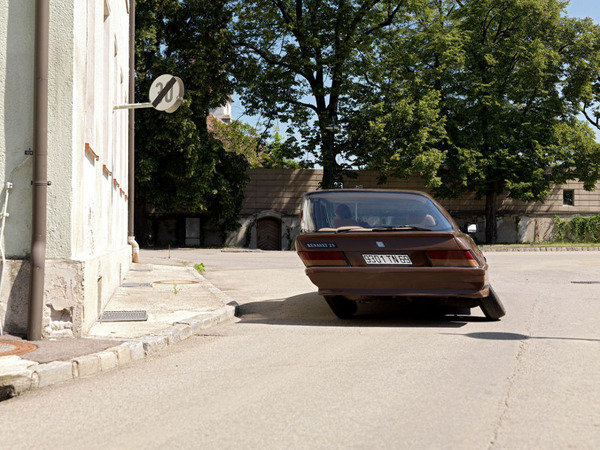Erwin Wurm
dal 10/12/2014 al 25/2/2015
Segnalato da
10/12/2014
Erwin Wurm
Dom umenia / Kunsthalle Bratislava, Bratislava
The artist deconstructed sculpture in order to re-define it as an area that may be related to the everyday reality and ordinary human life. Where are the limits, when in Wurm's philosophy anyone can be a sculpture and anything can be a sculpture?

To be politically correct we must say that Erwin Wurm is not only a sculptor. He is also a performer, photographer and director, but still more important – he is a critic, a psychoanalyst, an intellectual humorist and commentator. And he's close to philosophy, or more than close. He tries to expand beyond the field of visual art in his work and present it also in other contexts and structures.
Whatever our first impressions might be, Erwin Wurm is not a manipulator. He introduces us to another form of reality. A reality which is strikingly reminiscent of the one that we know from ordinary days, from everyday lives. Linking up with poststructuralist philosophy, he deconstructs so as by renewed reconstruction to uncover the basis of artistic reality. But the sculptures, objects, subjects, things, are only substitute elements. Wurm is interested in a world which projects itself as a possible fiction of our imagination. He analyses the fleeting instant of transience, of everyday occurrences, through which he tries to grasp that world and more precisely name it. Erwin Wurm presents us with a mirror where we do not see ourselves. But if we manage to look more deeply, we see another – new – world, which is remarkably similar to this world of ours and lets us comprehend our perception of reality in another perspective.
But where are the limits, when in Wurm's philosophy anyone can be a sculpture and anything can be a sculpture? Is it really as simple as that: we stop for one minute and become a sculpture? Without at all being politically correct, we might say that Wurm construes reality rather strictly. Is he not an anarchist who mindlessly opens borders in order to disrupt basic ideas? Quite the contrary. Dadaist though he is, when he intentionally provokes petit-bourgeois taste he has the clear aim of pushing the viewer, once he has fallen out of his grooves, towards the appropriate trap. Towards realisation that nothing is like what we were taught at school, but neither is it as we ourselves see it and think of it in perfect good faith. As Deleuze said, there are as many truths as the subjects who perceive them.
Juraj Čarný, curator, director of Kunsthalle Bratislava
Thanks for support:
Tatra banka, Austrian Cultural Forum
Opening: Thursday / 11 December / 6pm to 8pm
Dom umenia/Kunsthalle Bratislava
Námestie SNP 12 81234 Bratislava Slovak republic
Open:
WED - MON 12.00-19.00 / FRI 12.00-21.00
TUE – closed
Free entry



